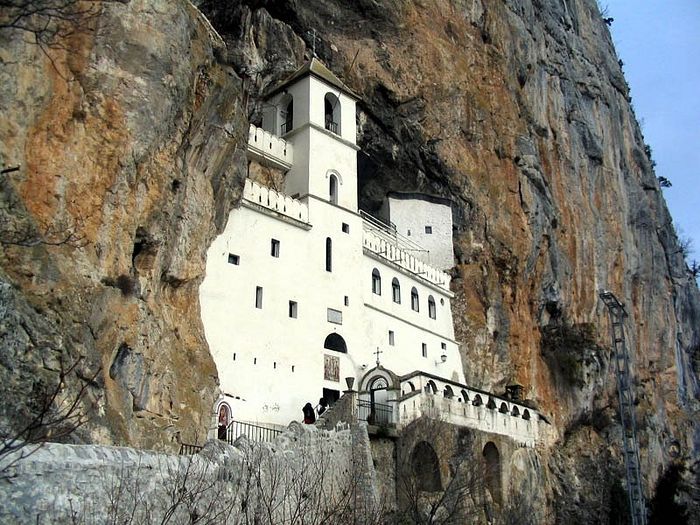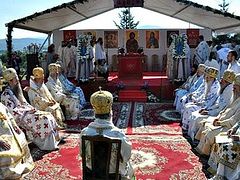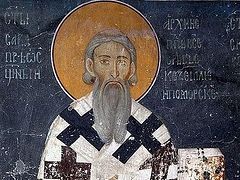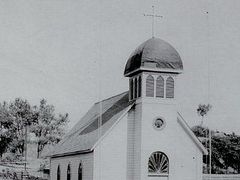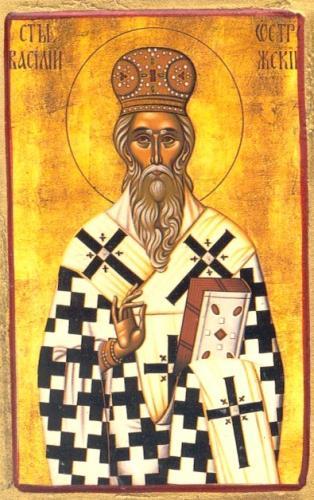
Nestled high up in the forbidding mountains of Montenegro, far away from the noise and bustle of big cities and tourist resorts, lies the monastery of Saint Basil of Ostrog, a rare jewel of the living Orthodox faith in today’s world. Every day countless people stream to the Ostrog monastery to bow down before the holy relics of Saint Basil and to venerate them, to entreat him in prayer to fulfil their spiritual or physical needs, to ask for the intercession and protection, or simply to give thanks to him for having helped them and guided them in life’s many temptations and challenges.
The holy monastery of Ostrog is first of all a wonder of nature. Underneath it flows the turbulent Zeta river crossing the Bjelopavlovichi plain, while high above it is a rocky mountain wreath, resembling a giant eagle’s nest, with the Ostrog cave where St. Basil lived in unceasing prayer and ascetic struggles. His Grace, the metropolitan Amphilochius of Montenegro and the Littoral, says in one of the most beautiful descriptions of the sanctuary of Ostrog: “It is as though this rocky nest had waited for centuries to become the home of an uncontainable sanctuary and the scene of many a crucial historic event. Thus this miracle of nature has become at the same time a wonder of history. The monastery of Ostrog has for more than 300 years been the focus of the history of not only the Ostrog region, but of a much wider area as well. This miracle is made even greater by the fact that all these historical events belong not only to the earthly, or horizontal plane: the Ostrog monastery has been and still is a historical stage of both heaven and earth. In Ostrog and around Ostrog, heaven and earth embrace. The earth rises up and is joined to the heavens, and the heavens come down to the earth, revealing to all people the greatest of mysteries in the person of the God-Man, Jesus Christ. In this way, the Ostrog cliffs have become our Mount Sinai, where God reveals to us, just as He once did to Moses, His Name, which is above all other names on earth and His Divine person. Indeed, in the theanthropoic person of Saint Basil of Ostrog, the ancient saying comes true: show me your man, and I will show you your God. He who sees and experiences the saint of Ostrog becomes a vessel in which and through which the God-Man, Jesus Christ, reveals Himself.”
For three hundred years without stopping, a constant and uninterrupted river of pilgrims flows to the monastery every day of the year, and especially on great feast days. People from all walks of life, from all parts of the country and abroad come to venerate the saint and to pray to God before his relics. They bring with them their sorrows and illnesses, their doubts and weaknesses, their sins and their repentance. It is truly touching to see many of them walk barefoot up the steep and rocky mountain slope to the upper monastery, perhaps unknowingly and unconsciously obeying God’s command to Moses on Mount Sinai: Take off your shoes from your feet, for the place on which you stand is sacred ground. Upwards they walk, in fear of God and in deep reverence for the holy father Basil, the Wonderworker of Ostrog. Upon reaching the tiny chapel set in the face of a giant rock and upon venerating his holy relics, they unburden their souls in contrite and repentant prayers. They leave with an abundance of spiritual gifts: many of them are blessed with the gift of health, others with the comfort in their sorrows. The spiritual eyes of some are opened at this holy site and they leave as people reborn and transfigured with faith in the One Living God. Perhaps this is the greatest miracle of all—the miracle of faith being born in the hearts and souls of unbelievers and doubters. In this respect, the holy monastery of Ostrog has become, through Saint Basil, the Serbian Mount Tabor, our mount of the Holy Transfiguration.
The twentieth century has seen many migrations take place from the old country to foreign lands, especially in the period immediately following the turmoil of the Second World War, as well as in its last decade, when the Serbian lands were ravaged by war and economic sanctions. Under such circumstances, hundreds and thousands of people were, for many different reasons, forced into emigration. Upon arriving and letting down roots in their new countries, they brought with them their faith, their love for God and His saints and the love for the Fatherland, all of which they passed on to younger generations of Serbs. In this way, a part of Heavenly Serbia has been brought and transplanted onto the soil of the New Continent and wherever Serbs live. Heavenly Serbia, an expression which is commonly misused and misunderstood today, is a phrase coined by another great son of the Serbian Orthodox Church, the holy bishop Nikolai of Zicha and Ochrid. There is a poem written by our beloved Vladika Nikolai, which clearly illustrates the deeper meaning of the expression. Heavenly Serbia is not a physical place. Its existence is real, but only in Christ and through Christ. It exists in the blood of our martyrs, in the sacrifice of our fathers and brothers, in the love of our mothers and sisters, in the unwavering faith of our people, in the prayers and ascetic struggles of our monks and nuns, in the patient long-suffering of our people and in the Cross they bear, in our repentance. Heavenly Serbia exists, but it is not in this world and not of this world. One may catch a glimpse of it if one looks deep into the inner chambers of one’s heart, a thing which is possible only through prayer and repentance. Our holy father Basil, as one who has even during his lifetime achieved holiness and boldness before God, is one of the beacons of Heavenly Serbia which lights up the way for the faithful wherever they may be.
And so, even today, far away from the Fatherland, new immigrants from Serbia, as well as older generations of immigrants in countries all over the world still call upon the name of our Christ-bearing father Basil, the Wonderworker of Ostrog. Churches are dedicated to him and his feast day is celebrated with vigils and holy liturgies wherever “two or three Serbs are gathered in the name of Christ.” His name is uttered with reverence and vials containing oil from the vigil lamp that burns over his relics are brought by travellers from Ostrog and lovingly shared among the faithful. From Toronto to Johannesburg, from Stockholm to Sidney, from Chicago to Buenos Aires and from London to Vancouver, Melbourne, New York, Caracas and God alone knows where else, Serbs of all ages and generations light candles and pray: “Help us, pray for us and protect us, o holy father Basil, Wonderworker of Ostrog and pleaser of God!”
And Saint Basil hears their prayers. A saint is like a ray of sunshine, identical in its nature to the sun itself, which along with the countless other rays shines upon the earth. The soul of a saint, having become one with God as with a spiritual sun, illumines as part of this sun the whole universe seeing and knowing the hearts and minds of all people and hearing their needs and prayers.
O, holy father Basil, God-pleaser and Wonderworker of Ostrog, you who even during your earthly life took care of your spiritual flock and interceded for them before the Throne of the Most High! Look also upon us living in strange lands, far away from the land of our fathers, pray for us and guide us that we may never stray from the path of our Lord and Saviour Jesus Christ, wherever we may be. Entreat Him to grant us forgiveness of our many sins and transgressions, to straighten our steps and to endow us with the gift of faith, hope and love, that we may one day find Life Eternal, along with the choirs of our holy forefathers of Heavenly Serbia. Holy hierarch Basil, Wonderworker of Ostrog, pray to God for us!
Translated by Ana Smilnaic
A Short Life of Saint Basil of Ostrog
From the Prologue of Ochrid
Saint Basil was born in Popovo Polje, a village in Hercegovina, of simple and God-fearing parents. From his youth he was filled with love for the Church of God and when he reached maturity he entered the monastery of the Dormition of the Most Holy Theotokos in Trebinje and there received the monastic tonsure. As a monk he quickly became renowned because of his genuine and infrequently-found ascetic life. Saint Basil took upon himself mortification upon mortification, each one heavier and more difficult than the last. Later, against his will he was elected and consecrated as bishop of Zahumlje and Skenderija. As a hierarch he first lived in the monastery of Tvrdosh and from there, as a good shepherd, he strengthened his flock in the Orthodox Faith, protecting them from the cruelty of the Turks and the cunning ways of Latins. When Basil was exceedingly pressed by his enemies and Tvrdosh destroyed by the Turks*, he moved to Ostrog, where he lived an austere ascetic life, protecting his flock by his ceaseless and fervent prayer. He fell asleep peacefully in Lord in the sixteenth century, leaving behind his incorrupt Relics, incorrupt and miracle-working to the present day. The miracles at the grave of Saint Basil are without number. Christians and Muslims alike come before his Relics and find healing for their gravest illnesses and afflictions. A great people’s assembly (sabor) occurs there annually on the Feast of Pentecost.
St. Nicolai of Zicha
*A new church was built in our day upon the ruins of the Old Tvrdosh monastery by Nikola Runjevac from the village of Poljica near Trebinje—a wonderful and glorious monumental church (zaduzbina) before God and before his people.
The Glorification of St. Basil of Ostrog
Immediately after the falling asleep of St. Basil in 1671, people started coming in great numbers to pray at his grave, just as they were accustomed to doing during his earthly life. Many miracles began taking place at the site of his grave and they have not ceased to this day.
Seven years after giving up his soul to God, in 1678, St. Basil appeared in a dream to Fr. Rafailo (Kosijerevac) the Abbot of the St. Luke Monastery in Zhupa near Nikshich, and ordered him to go to Ostrog and open up the saint’s grave. The abbot paid no attention to the dream and did not go. He had the same dream again but he again ignored it. St. Basil then appeared to the abbot a third time, dressed in a bishop’s vestments, with a censer in his hand. The abbot woke up in fear and trepidation and told the brotherhood of his monastery about his dream. They agreed at once to make a hasty journey to Ostrog.
Upon their arrival they first informed the Ostrog monks of the abbot’s dream and then look upon themselves a strict fast, all the while serving the complete cycle of daily prayers with Holy Liturgy. They did so for seven days. On the seventh day, they censed the saint’s grave and opened it.
Before them appeared the saint in a glorified body the colour of pure wax, giving out the fragrance similar to that of basil leaves. Then the monks placed his incorrupt body in a case and took it to the upper monastery, to the church of the Presentation of the Most Holy Theotokos, where it rests to this day.
News of the glorification of St. Basil’s body quickly spread and people began to flock in great numbers to venerate his holy and wonderworking relics. Not only Orthodox Christians, but also Roman Catholics and Lutherans, and even Muslims came to seek help at the great sanctuary of Ostrog. According to their faith in the mercy of God and that of St. Basil they received help and found consolation.
Even today pilgrims from all parts of the country, of all nationalities and religions come before the Wonderworker of Ostrog. Many people travel to Ostrog from abroad. From the holy reliquary arise prayers in many languages. Many parents bring their children to be baptised before the relics of St. Basil and many name their offspring after the saint. Many a marriage ceremony has been performed at Ostrog, countless confessions have been made and many people have partaken of the Holy Mysteries before the holy relics, while countless others have asked for prayers to be read for their health and salvation.
Many sacrifices and donations are brought to the holy father at the Ostrog monastery, but the greatest sacrifice of all is that of sincere repentance and the will to cleanse one’s heart before God and St. Basil. Even the godless and atheists respect and honour St. Basil and utter his name with fear. For, as everyone knows, one did not make light of St. Basil while he lived, and one certainly does not make light of him now when he is glorified.
Before the merciful Ostrog saint the Serbs pour out their sorrows and pains and offer warm prayers for their living and departed relatives. Having prepared for this encounter by fasting and prayer, pilgrims from near and far, on feast days and on weekdays gather at Ostrog in great numbers to venerate the saint, to tell him of their sorrows, to weep before his reliquary and to confess their sins and receive a blessing. Besides the regular church fasts the people often promise to take on a special fast. This fast is called “the week of the Holy Father Basil”, and it usually precedes his feast day. Pronouncing the saint’s name is traditionally accompanied by the words, “Glory and mercy be upon him”. Many an oath has been sworn before the relics of St. Basil, many a promise made …
The Power of God and the Temptations of History
During his earthly life the saint was never left in peace but was persecuted by many enemies of God and by the chief enemy of our salvation. After his repose his holy relics were not spared by the evil one, either.
The first time that the Ostrog monks had to conceal the relics of St. Basil was in 1714, when Numan-pasha Chuprilich attacked and devastated Montenegro. The monks buried the relics below the monastery, near the Zeta river. The river overflowed and flooded the area where the relics were buried, but miraculously the water penetrated neither the reliquary, nor the relics of the saint.
The second time the relics had to be hidden was during the siege of Ostrog in the winter of 1852. The Turkish commander Omar Pasha encircled the monastery and the siege lasted for nine days. Thirty Montenegrins, headed by the great vojvoda (duke) Mirko Petrovic, father of prince Nikola, courageously defended the monastery. When they succeeded, with the help of St. Basil, in driving away the Turks, they served a thanksgiving molieben to God, the Most Holy Theotokos and St. Basil in the little church of the Presentation. After that the Montenegrins took the saint with them to Cetinje and placed him in the church of the Nativity of the Holy Virgin, near the relics of St. Petar of Cetinje. There they remained until the spring of 1853, when they were again returned to Ostrog. During the war with the Turks the monastery of Ostrog was burned and looted. Many Ostrog treasures, as well as documents dating from the time of St. Basil, disappeared forever.
The third time the relics of the saint were transferred was during the war in 1876-1877. They were again taken to Cetinje, where they remained for about a year. They were brought back to Ostrog in a majestic procession in 1878.
During World War II, in February 1942, when enemy grenades rained upon Ostrog, the monks, fearing that the church of the Presentation might be hit and destroyed, took the holy relics into a little cave behind the monastery building. This fear proved to be unfounded, for the grenades flew all around the monastery and fell and exploded, but the monastery itself was never hit, nor was anyone injured during these attacks. The saint guarded his flock as he had always done before …

